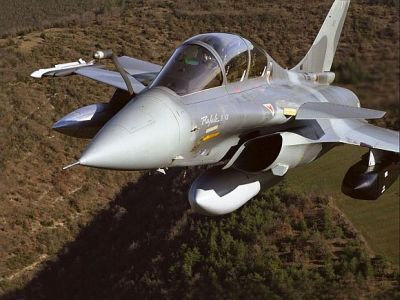 Even as three Rafale fighters line up in Bengaluru for eye-popping aerobatics displays at the Aero India 2015 exhibition this week, senior ministry of defence sources say the proposal to buy the French fighter is "effectively dead".
Even as three Rafale fighters line up in Bengaluru for eye-popping aerobatics displays at the Aero India 2015 exhibition this week, senior ministry of defence sources say the proposal to buy the French fighter is "effectively dead".
The reason: During three years of negotiations between Dassault and MoD officials in the so-called "contract negotiation committee", it has emerged that Dassault's bid was actually higher than that of the Eurofighter Typhoon, not lower as the MoD had announced on January 31, 2012.
Dassault had submitted a sketchy commercial bid, and when the CNC obtained details from the French company to arrive at the actual cost of the Rafale, the figures added up to significantly more than had originally been estimated.
The confusion is due partly to MoD inexperience with "life cycle costing". The global tender for 126 medium multi-role combat aircraft (MMRCA) was the first time the MoD was awarding a contract based on LCC. This meant the winner would not be the fighter with the cheapest purchase price; instead the chosen fighter would be the one that was cheaper to buy, fly, maintain and overhaul over its 30-40 year service life.
"An inexperienced MoD, working off incomplete and sketchy details provided by Dassault, had incorrectly adjudged the Rafale cheaper. Now, after three years of obtaining clear figures from the French, we find India would be paying significantly more than had been initially calculated," says an official in the CNC.
Contacted for comments, the MoD has not responded.
The MoD has been backing away from the Rafale for two months now. On December 30, 2014, Defence Minister Manohar Parrikar admitted for the first time there were "complications" in the negotiations with Dassault, and outlined the IAF's alternatives.
"The Sukhoi-30MKI is an adequate aircraft for meeting the air force's needs", said Parrikar.
Last week the prime minister was pointedly distanced from the Rafale. On Saturday, an unusual MoD press release denied a newspaper report that the PM would fly in the Rafale during the Aero India 2015 air show at Bangalore this week.
"It is clarified that there is no plan for the Prime Minister Shri Narendra Modi to fly in any fighter jet. The news item is incorrect, misconceived and is not based on facts", stated the MoD.
This is the second time the MoD has gone wrong in LCC evaluations. As Business Standard reported on Saturday ("Defence ministry official questions whether Pilatus was cheapest trainer", February 14) an internal MoD noting last month sharply questioned the award of a contract for 75 PC-7 Mark II basic trainer aircraft to Swiss company, Pilatus. There too, the LCC was calculated incorrectly.
Significantly, that noting, signed by AR Sule, the MoD's "Finance Manager (Air)", who handles financial aspects of military aircraft purchases, alerts the defence minister to issues with LCC evaluation in the MMRCA tender.
Sule writes: "The issue (with LCC calculations) may be brought to the notice of the RM (Raksha Mantri) as two high value cases of IAF based on LCC model are at CFA (competent financial authority) approval stage."
Dassault's impending loss, however, will not be the Eurofighter Typhoon's gain. Eurofighter GmbH has maintained an expensive presence in Delhi for the last three years, just in case Dassault's bid encounters trouble. But Parrikar has made it clear that procurement procedures do not permit the second-placed vendor, i.e. Eurofighter GmbH, to be awarded the contract in place of the "preferred vendor", i.e. Dassault.
Dassault was adjudged winner of the MMRCA tender through a two-stage process. In the first stage the IAF ruled out on April 27, 2011 four of the six competing fighters. Boeing's F/A-18E/F Super Hornet; Lockheed Martin's F-16IN Super Viper; Saab's Gripen NG, and the Russian MiG-35 were adjudged not to have met the IAF's performance requirements.
In the second stage, the commercial bids of the remaining two vendors -Dassault's Rafale, and the Eurofighter Typhoon - were compared on a "life cycle basis" to select the lower bidder. On January 31, 2012, the Rafale was chosen as the cheaper of the two options, a decision that the MoD is now walking away from.
A senior official familiar with the Rafale contract negotiations says, "Given the value of this contract, it was always going to be scrutinised in detail. No MoD official is willing to endorse a Rs 100,000 crore contract with Dassault when it seems as if Rafale is not even the cheapest option".
This means the IAF would have to look elsewhere for fighters to increase its depleted squadrons from the current 35 to the authorised 45 (with 18 fighters in each squadron).
Besides enlarging its Sukhoi-30MKI fleet from the 272 fighters HAL will build by 2018, the IAF could order more indigenous Tejas Mark I fighters, over and above the 40 now on order from HAL. The IAF could also intensify its co-development of the Indo-Russian Fifth Generation Fighter Aircraft (FGFA) with Sukhoi.
For Dassault, an Indian cancellation would be a serious blow. The French air force and navy, dogged by budget cutbacks, have reduced their planned Rafale numbers from 310 to just 180. On Friday, Egypt announced it would buy 24 Rafale fighters, becoming the first and only overseas buyer for Dassault.
"India will take longer than Egypt," said Eric Trappier, the chief executive officer of Dassault on Friday.












 © 2025
© 2025